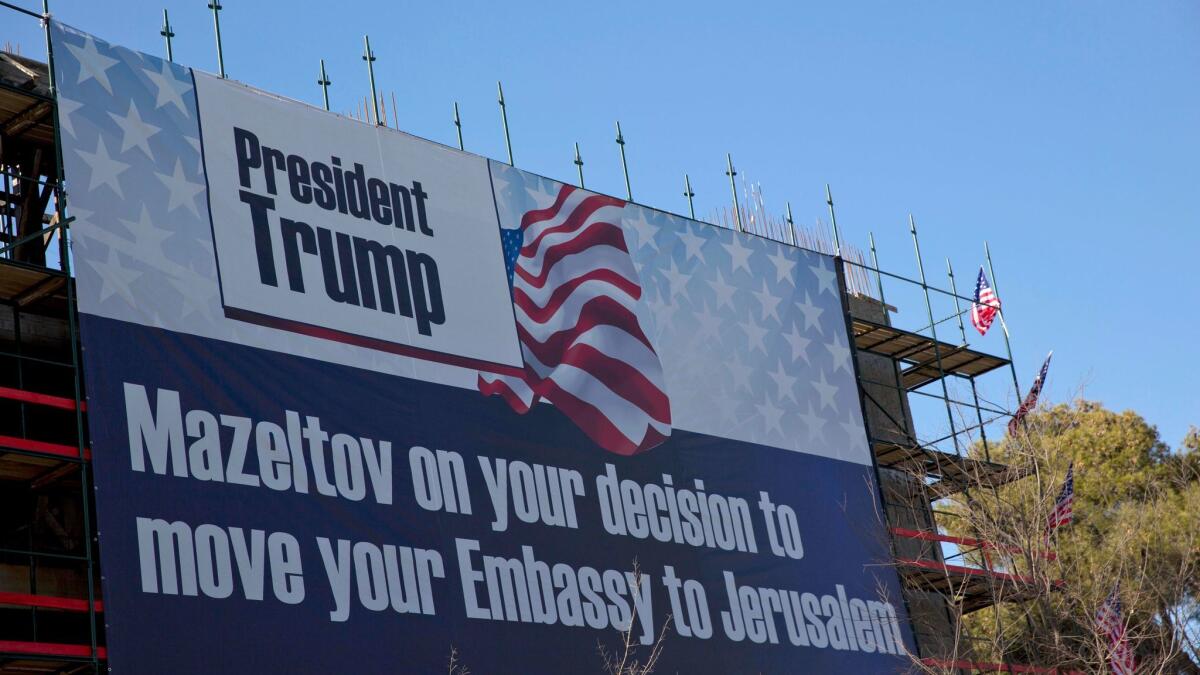Editorial: Has Trump come to his senses on moving the U.S. embassy to Jerusalem?

- Share via
It’s beginning to look as if President Trump is having second thoughts about his campaign promise to move the U.S. Embassy in Israel from Tel Aviv to Jerusalem. If so, he will be following in the footsteps of his predecessors — and putting the national interest above politics.
Trump wasn’t the first presidential candidate to promise to move the embassy to Jerusalem, but his commitment has been taken more seriously than those of past candidates. David Friedman, Trump’s choice for ambassador to Israel, has said that he looks forward to performing his service “from the U.S. Embassy in Israel’s eternal capital, Jerusalem.”
Yet when he was asked Monday about plans for moving the embassy, White House Press Secretary Sean Spicer said: “There’s no decisions. We’re at the very early stages of that decision-making process.” When a reporter pressed him about whether the embassy will have been moved to Jerusalem by the end of Trump’s four-year term, Spicer replied: “If it was already a decision, then we wouldn’t be going through a process.”
In 1995 Congress passed the Jerusalem Embassy Act, which required the embassy to be moved to that city by May 31, 1999 — but also authorized the president to waive that provision “to protect the national security interests of the United States.” That is exactly what presidents since then have done — including Bill Clinton, who in 1992 endorsed “the principle of moving our embassy to Jerusalem,” and George W. Bush, who said in 2000 that “as soon as I take office I will begin the process of moving the U.S. ambassador to the city Israel has chosen as its capital.”
Clinton and Bush changed their minds for a good reason: Moving the embassy would inflame Arab opinion and make achievement of an Israeli-Palestinian peace agreement even harder to achieve.
Although West Jerusalem is where the government of the Jewish state is based, East Jerusalem — which Israel effectively annexed after the 1967 Arab-Israeli War — is where Palestinians hope to establish a capital of a state of their own. Putting the U.S. embassy in Jerusalem could send a message that the U.S. accepts Israel’s claim to both halves of the city, rejecting the Palestinians’ ambitions for an area that’s overwhelmingly Palestinian in population. And it’s not at all clear that Israel’s claim is valid.
Trump, who has invited Israeli Prime Minister Benjamin Netanyahu to the White House next month, once described a potential Israeli-Palestinian peace agreement as “the ultimate deal.” He would be making such a deal less possible by following through with this campaign promise. What Spicer called the “decision-making process” should end with a reaffirmation of current policy.
Follow the Opinion section on Twitter @latimesopinion and Facebook
ALSO
What Trump means when he says ‘America first’
The new Trump administration sounds more like the old Trump campaign
The TPP is dead, but don’t bury it yet
More to Read
A cure for the common opinion
Get thought-provoking perspectives with our weekly newsletter.
You may occasionally receive promotional content from the Los Angeles Times.









